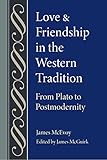Love and friendship in the western tradition : from Plato to postmodernity / James McEvoy ; edited by James McGuirk.
Material type: TextSeries: Studies in philosophy and the history of philosophy ; 066Publisher: Washington, D.C. : The Catholic University of America Press, [2023]Copyright date: c2023Description: xxxiv, 373 pagine ; 23 cmContent type:
TextSeries: Studies in philosophy and the history of philosophy ; 066Publisher: Washington, D.C. : The Catholic University of America Press, [2023]Copyright date: c2023Description: xxxiv, 373 pagine ; 23 cmContent type: - volume (nc)
- 9780813236698
- BD436 .M3757 2023
- B 21.S78-66
| Item type | Current library | Call number | Status | Barcode | |
|---|---|---|---|---|---|
 Opera (Magaz.)
Opera (Magaz.)
|
Biblioteca "Angelicum" Pont. Univ. S.Tommaso d'Aquino Temporary Library | B 21.S78-66 (Browse shelf(Opens below)) | Available | 0030219731 |
Browsing Biblioteca "Angelicum" Pont. Univ. S.Tommaso d'Aquino shelves, Shelving location: Temporary Library Close shelf browser (Hides shelf browser)
| No cover image available |

|

|

|

|
No cover image available | No cover image available | ||
| B 21.G7-9 The works of Aristotle. | B 21.S78-28 Thomas Aquinas and His Legacy / | B 21.S78-45 Form and being : studies in Thomistic metaphysics / | B 21.S78-66 Love and friendship in the western tradition : from Plato to postmodernity / | B 21.W43 Western philosophy : an anthology / | B 22.B5 A-Z Identité et réalité / | B 22.B5 A-Z Du cheminement de la pensée / |
Include bibliografia e indice.
"Love and Friendship in the Western Tradition comprises a collection of essays written over a 25 year period by the late Rev. Professor James McEvoy on the theme of friendship. The book traces the genesis and development of philosophical treatments of friendship from Greek philosophy, through the Middle Ages, to modern and postmodern philosophy. The collection's three major concerns are: (1) the history of philosophical discussions of friendship; (2) the role of friendship in the cultivation of the philosophical life; (3) the marginalization of friendship as a theme for philosophical reflection and practice in the modern period. As the author was primarily a medievalist, a great deal of the focus of the essays is on the development of the theme of friendship in the Middle Ages (in the thought of Augustine, Aquinas, Aelred of Rievaulx, Henry of Ghent, Robert Grosseteste, etc.). However, this focus, while a value in itself, also serves to connect philosophical perspectives on friendship from before and after the middle ages. It connects to the time before inasmuch as much of the work done on friendship in the Middle Ages is anchored in interpretations of Aristotle and Plato, and it connects to the time after by providing a counterpoint to the modern paradigm of what constitutes the philosophical life. The collection combines historical with thematic approaches to scholarship on this issue and is one of the only books of its kind to do so. It is, perhaps, unique in its historical sweep and will prove to be a canonical source for further research on this topic".


